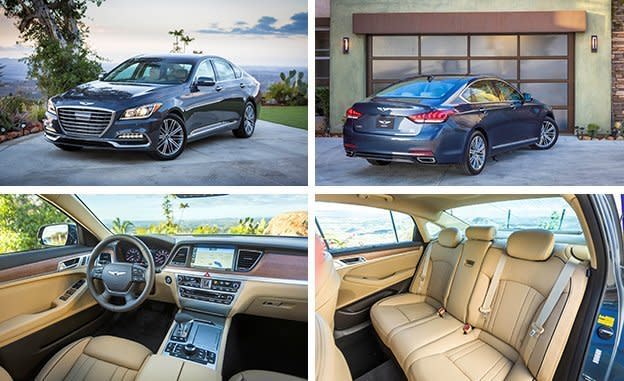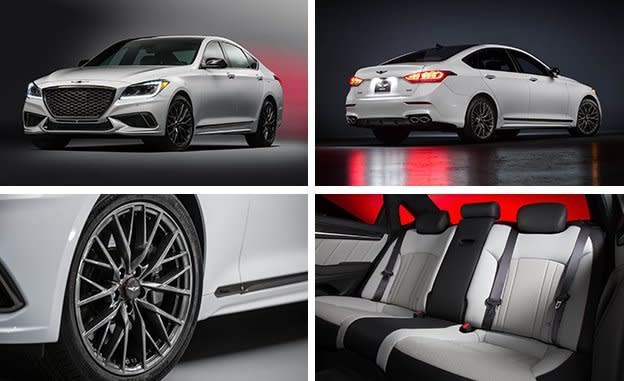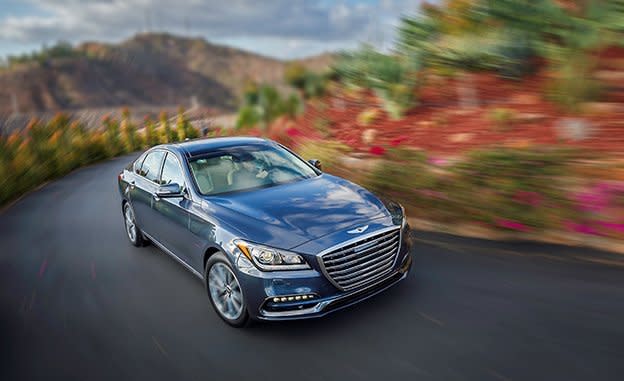2018 Genesis G80: Now with a Twin-Turbo Sport Trim and Mild Facial Reconstruction

When Hyundai’s infant Genesis luxury brand lifted off the proverbial tarmac this year, it did so with two models: the all-new G90 full-size sedan and the pre-existing G80. Before Genesis the brand, there was Genesis the Hyundai model, which was stripped of its Hyundai badging and rechristened the G80. The badge swap was more or less the extent of the changes during the 2016 Genesis sedan’s transition to the 2017 G80—well, that and a price bump and an increase in standard safety tech. For the 2018 model year, Genesis finally tweaks the G80 and adds an intriguing Sport model.
The G80 really didn’t need to be fiddled with, as the original formula cooked up when it was still a Hyundai successfully incorporated equal measures of luxury and competent driving dynamics. Yet the optics of rolling the former Hyundai Genesis into the G80 could have been strengthened by a few extra touches like those administered to this 2018 G80. If you look closely enough—and have a photo of a 2017 model handy—you might notice that the front bumper has been subtly reshaped around the intakes and the lower valance area, while the grille and the rear bumper see similarly limited reconstructive work. There are also new 18-inch wheels for the entry-level G80 3.8 model. The G80’s base 3.8-liter V-6 and optional 5.0-liter V-8, as well as the rest of its mechanicals, go untouched.

It took us a few minutes poring over the before-and-after photos of the interior to figure out what is new about the analog dashboard clock, but we eventually discovered that a tiny winged Genesis badge now graces the timepiece’s face. Only G80 superfans will pick up on the new T-shaped shift knob and the instrument cluster that trades digital coolant-temperature and fuel-level readouts for analog gauges. Genesis said it also improved the G80’s interior noise, vibration, and harshness levels, although the G80 already excelled in this area.
A Shot of Sport!
The most exciting development is the new G80 Sport, which as its name suggests is a more dynamic take on the G80 that includes snarly intakes, more aggressive front and rear bumpers, a mesh grille in place of the regular G80’s slatted piece, a handsome set of 19-inch wheels wearing performance tires, and a subtle lower-body kit. Oh, and Genesis borrowed the sweet 365-hp 3.3-liter twin-turbocharged V-6 from the larger G90 and bolted it into the Sport’s engine bay. We really like this 3.3-liter turbo in the G90; it deftly motivates that larger four-door while making nice noises and transmitting zero bad vibrations to the cabin.
In the smaller G80, the 3.3T has the potential to outgun the range-topping 5.0-liter V-8 engine. The turbo V-6 serves up 365 horsepower and 376 lb-ft of torque (55 horsepower and 7 lb-ft less than the V-8), but if the G80 Sport’s mass falls closer to that of the lighter, 311-hp G80 3.8 than the G80 5.0, it could be quicker than both, particularly if optioned with the HTRAC all-wheel-drive system that is also offered with the other two engines.

Backing up the turbocharged engine are upgraded vented rear brake rotors, retuned adaptive dampers, and a “sport tuned” version of the regular G80’s Hyundai-designed eight-speed automatic transmission. The detailing inside and out is impressive, too, with unusual and attractive copper-colored accents on the grille, wheel caps, and headlight housings as well as a host of black-colored trim pieces, black-painted door mirrors, and purposeful-looking quad exhaust outlets.
As for how the Sport fits into the broader narrative surrounding Hyundai’s nascent N performance sub-brand, the short answer is that it doesn’t. At least, it does not publicly do so; Hyundai has made it clear that only its performance-tuned cars will wear the N badge. Hopped-up Genesis cars, even if they’re developed by the N engineering team as is expected, will be named something else. We’ll go out on a limb here and assume that the Sport name applied to this G80 will denote the Genesis brand’s lesser performance models, much like Mercedes-AMG’s new 43-badged models and BMW’s M Performance vehicles. This is based on a recent interview with Hyundai, Kia, and Genesis’s in-house performance boss, Albert Biermann, during which he bandied about horsepower figures in the 500 and 600 range for the full-fledged performance cars.

It’s in the Details
Lesser or otherwise, the G80 Sport will be generously equipped when it goes on sale in spring 2017. Standard equipment includes sport seats with copper-hued stitching, carbon-fiber dashboard trim, aluminum pedals, adaptive LED headlights, a 17-speaker Lexicon audio system, a Qi wireless smartphone-charging pad, and the largest of the G80’s available dashboard displays, a 9.2-inch unit. Buyers can choose between black or gray interior color schemes as well as two Sport-exclusive colors, Polar Ice and Sevilla Red, that stand out among the regular G80’s array of mostly muted paint colors. Genesis will also offer Casablanca White, Caspian Black, and Himalayan Gray hues for the less adventurous.
Given Hyundai’s relentless march of progress in building not only ever better cars but ever better-to-drive cars, we’re cautiously hopeful that the G80 Sport can deliver on its promise of improved performance. The standard G80, regardless which engine is under the hood, leaves plenty of room for a sharper-handling, more aggressive model like the Sport.


 Yahoo Autos
Yahoo Autos 